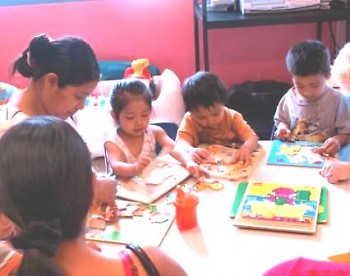Back in September, I wrote a piece on how small the world is for inner city children. Lack of opportunities to experience activities children from more affluent families take for granted hinders less fortunate children scholastically. If an elementary school student must frequently look up words that his or her peers know from experience, it is time consuming, frustrating and embarrassing for them.
The estimate, according to a Grand Rapids Public School assessment, that 83 percent of kindergartners scored less than proficient in a composite of key literacy indicators seems surprising and disheartening. Looking at it another way, 17% of children are considered proficient. Are they are they somehow exceptional? If that is the case, there is little we can do.
If, however, we are products of our environment, there are numerous improvements that could be made to help children prepare for school. We could make preschool mandatory, hold parents responsible, recruit more volunteers for education or devote more tax dollars to preschool. A survey following the original post gave those options for consideration. As one respondent to the survey rightly noted, it is a complicated problem and requires more than one solution.
Take for example the idea that making universal preschool available to disadvantaged children is the answer. If that is the case, why has Head Start not succeeded? The nation's largest federal preschool program has served more than 15 million children since 1965. The Department of Health and Human Services assembled the most comprehensive synthesis of Head Start impact studies to date. Its findings say that it has failed to have a lasting impact on child development. These studies show that by the time children enter second grade, any short-term cognitive, social, and emotional gains experienced by Head Start children have completely vanished.
Other studies have found that the effects of other preschool programs last anywhere from third to fifth grade.
There is a reason that the impact of preschool wears off with time. More attention is given to those who are lagging, especially if they are the majority. Eventually, the more advanced students regress to the mean.
Preparing a five-year old for school isn’t a guarantee of long-term academic success. Once in school, it takes more than literacy skills to be successful. There is a need for social skills – cooperation, self-control, confidence, curiosity, ability to take turns, play with others and be empathetic. Entering school without those skills will handicap a child’s ability to learn.
Much is made of the high drop-out rates from high school. Would making high quality preschool available to every child change that? Edward Zigler, co-founder of Head Start and director of the Bush Center in Child Development and Social Policy at Yale University doesn’t think so. He says, "We simply cannot inoculate children in one year against the ravages of a life of deprivation. This is not the first time universal preschool education has been proposed. Then, as now, the arguments in favor of preschool education were that it would reduce school failure, lower dropout rates, increase test scores, and produce a generation of more competent high school graduates. Preschool education will achieve none of these results."
It is often suggested that parents should be responsible for preparing their children for school. Unfortunately, not all parents are qualified or able to provide educational opportunities for their children. Families living in poverty have limited financial means or time to provide the necessary assistance. Non-English speaking parents can’t prepare a child for an English speaking school. Some parents don’t have the discipline or ability to educate children. Would educating parents to educate children be helpful?
In the survey, 22% of the respondents thought that the basic needs of a family had to be met before addressing education. That’s the same percentage as thought that parents should be responsible. That suggests that a stable home and family are high on our priority list.
Rather than thinking about lack of school preparedness as a single solution problem. Think of it as the reader did who said that it was a complicated problem requiring more than one solution. In that case, how should we allocate our resources?
Here’s the hypothetical. Given the opportunity to allocate $100 of your tax dollars that go toward early childhood education, how would you divide it?
How much of the $100 would you spend in each of these areas?
- Mandatory preschool
- Parent education
- Provide basic needs (housing, food, etc.) to children
- Train volunteers to tutor children
- Other strategies (please specify)
To make it interesting, here are two more variables. 1.) Allocate less than $100, if you think that your tax dollars can be spent better elsewhere. 2.) Give some of your money to elementary school education, if you think that would be more effective.
Feel free to elaborate where you think it is necessary.
This is a completely unscientific poll and it certainly won’t influence public policy. However, given how much has been spent to raise graduations rates with little success, it would be interesting to know what the taxpayer thinks.
Envision Grand Rapids in twenty years if in 2012, 25% of children entering school were proficient in the key literacy indicators instead of 17%.
The Rapidian, a program of the 501(c)3 nonprofit Community Media Center, relies on the community’s support to help cover the cost of training reporters and publishing content.
We need your help.
If each of our readers and content creators who values this community platform help support its creation and maintenance, The Rapidian can continue to educate and facilitate a conversation around issues for years to come.
Please support The Rapidian and make a contribution today.


